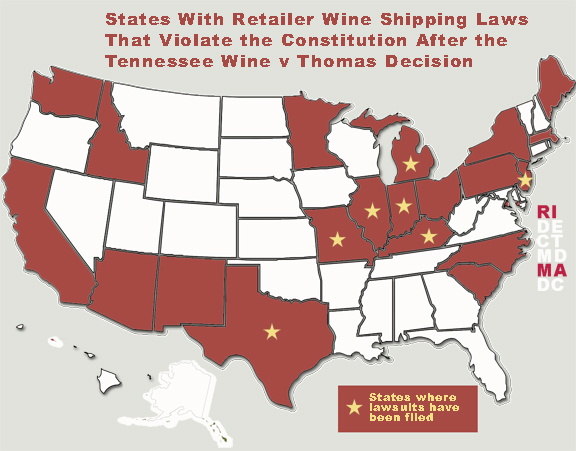 Twenty-one states across the country are in violation of the Constitution following the Supreme Court’s Tennessee Wine v Thomas decision in June. Wine shipping laws in these twenty-one states violate the Commerce Clause with their bans on wine shipments from out-of-state wine retailers.
Twenty-one states across the country are in violation of the Constitution following the Supreme Court’s Tennessee Wine v Thomas decision in June. Wine shipping laws in these twenty-one states violate the Commerce Clause with their bans on wine shipments from out-of-state wine retailers.
In Tennessee Wine v Thomas, Justice Samuel Alito held that states may not pass protectionist laws that discriminate against out-of-state wine stores and retailers by banning them from shipping wine to consumers. Twenty-one states need to consider changes to their wine shipping laws in order to come into compliance with the Constitution.
In the wake of the June Supreme Court ruling, lawsuits challenging bans on wine shipments from out of state are now underway in Indiana, Illinois, Kentucky, Michigan, Missouri, New Jersey, and Texas.
The remaining states with unconstitutional wine shipping laws are California, Idaho, Maine, Massachusetts, Minnesota, New York, North Carolina, Ohio, Pennsylvania, Rhode Island South Carolina and Washington State.
The Court spoke loud and clear in Tennessee Wine v Thomas when it applied the holdings in the 2005 Granholm v Heald Supreme Court case to retailers. The Granholm decision and now the Tennessee Wine decision holds that states may not discriminate against out-of-state wine stores by banning their wine shipments into the state, while at the same time allowing their own wine stores to ship wine to their state’s consumers. While NAWR strongly supports the lawsuits filed in seven states, it urges lawmakers in the other 14 states to take it upon themselves to fix their wine shipping laws, give their consumers access to wines they can’t find locally and abandon protectionist lawmaking.
NAWR has drafted a Model Wine Retailer Shipping Bill now located on its website that can help guide states as they begin the legislative work to fix their unconstitutional retailer wine shipping laws.